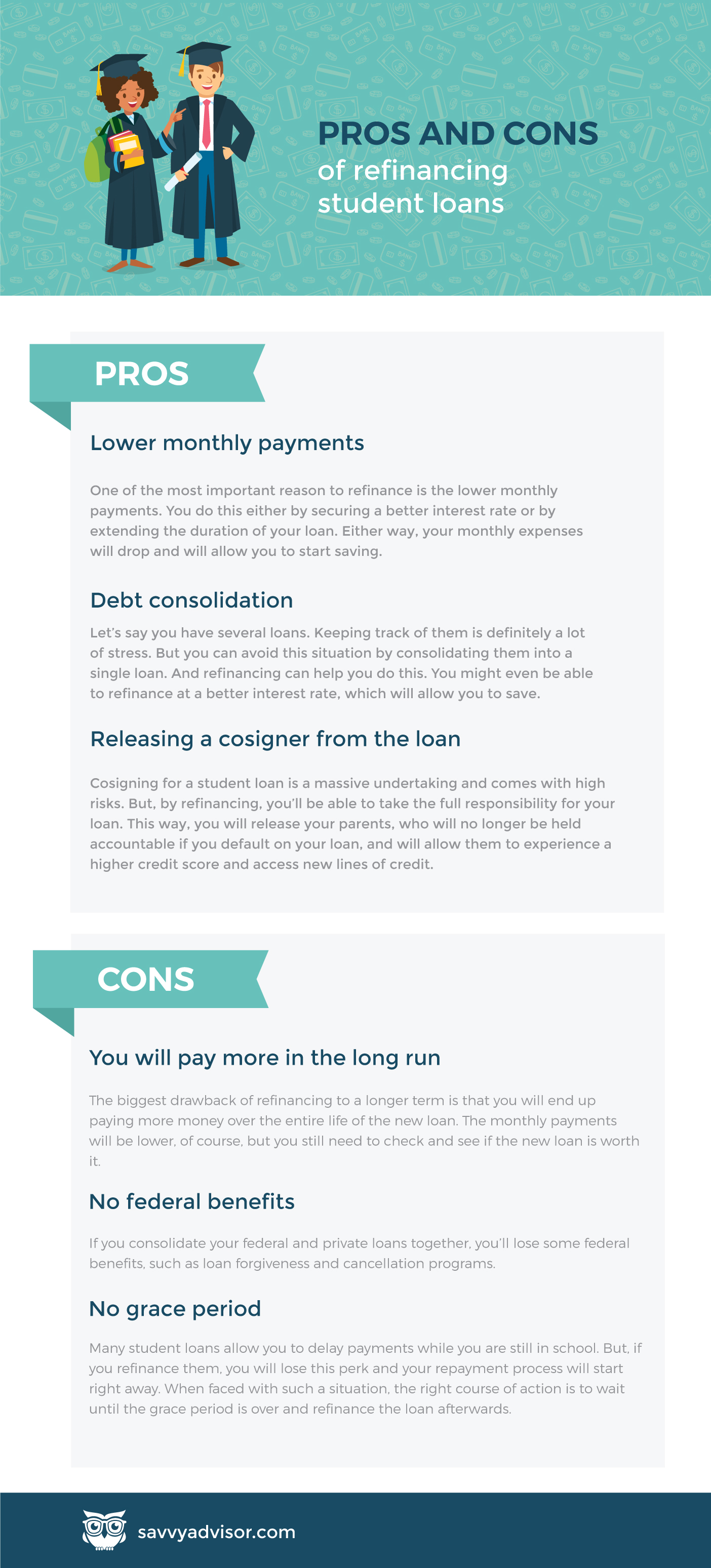The Pros And Cons Of Refinancing Federal Student Loans

Table of Contents
Potential Benefits of Refinancing Federal Student Loans
Refinancing your federal student loans can offer several significant advantages, but it's vital to understand the complete picture before proceeding.
Lower Monthly Payments
One of the most appealing aspects of refinancing is the potential for lower monthly payments. This is achieved either through extending the repayment term or securing a lower interest rate.
- Potential Savings: Depending on your current interest rate and credit score, refinancing could slash your monthly payments by hundreds of dollars. For example, refinancing a $50,000 loan from 7% to 5% could significantly reduce your monthly obligation.
- Factors Influencing Interest Rate Reductions: Your credit score plays a crucial role. A higher credit score typically qualifies you for a lower interest rate. The amount you're refinancing and whether you have a co-signer also influence the interest rate offered.
- The Trade-off: Remember that a lower monthly payment often comes with a longer repayment term. This means you'll end up paying more interest overall, despite lower monthly installments.
Lower Interest Rates
Refinancing often allows you to secure a lower interest rate than your original federal student loan interest rate. This can translate to substantial savings over the life of the loan.
- Factors Affecting Interest Rates: Market conditions play a significant role in determining interest rates. Your creditworthiness, as reflected in your credit score and debt-to-income ratio, is another major factor.
- Comparing Interest Rate Savings: Carefully compare interest rate offers from multiple lenders before making a decision. Look for lenders with transparent fees and competitive rates.
Streamlining Payments
Juggling multiple federal student loans can be overwhelming. Refinancing consolidates these loans into a single, manageable payment.
- Easier Tracking: Instead of tracking multiple payments and due dates, you'll have one simple monthly payment to manage.
- Improved Financial Organization: This simplification can significantly improve your financial organization and reduce stress.
Access to Different Repayment Plans
Federal student loan programs offer specific repayment plans. Refinancing may open doors to repayment plans not initially available.
- Flexibility: You might gain access to shorter-term repayment options for faster payoff or more flexible payment options tailored to your changing financial circumstances. This could include options such as bi-weekly payments or interest-only payments during specific periods.
Potential Drawbacks of Refinancing Federal Student Loans
While refinancing offers attractive possibilities, it's crucial to be aware of the potential downsides.
Loss of Federal Loan Benefits
This is perhaps the most critical drawback. Refinancing your federal student loans means losing crucial federal benefits.
- Income-Driven Repayment Plans (IDR): IDR plans adjust your monthly payments based on your income and family size. These are unavailable after refinancing.
- Deferment/Forbearance Options: These options allow you to temporarily suspend or reduce your payments during financial hardship. These benefits disappear upon refinancing.
- Loan Forgiveness Programs: Certain professions, like teaching or public service, qualify for loan forgiveness programs after a specified period of service. Refinancing often disqualifies you from these programs. Understanding the potential implications of losing these programs is crucial before making a decision.
Higher Total Interest Paid (Potential)
Even with lower monthly payments, a longer repayment term often means paying significantly more interest over the loan's lifespan.
- Example Calculation: Consider comparing the total interest paid on your current loan versus the projected total interest paid with a refinanced loan with a longer term. The difference can be substantial.
Risk of Increased Interest Rates (Potential)
Interest rates are subject to market fluctuations. Your refinanced loan's interest rate could potentially rise unexpectedly.
- Variable vs. Fixed Rates: Carefully consider whether a fixed or variable interest rate is best suited to your risk tolerance and financial circumstances. Understand the potential impact of unexpected rate increases.
Impact on Credit Score (Potential)
Applying for refinancing involves a hard credit inquiry, which can temporarily lower your credit score.
- Minor and Temporary Impact: The impact is usually minor and temporary, recovering quickly after the application process.
Conclusion
Refinancing federal student loans presents both advantages and disadvantages. Lower monthly payments and streamlined repayment are alluring, but losing valuable federal benefits like IDR plans and loan forgiveness programs can have significant long-term financial consequences. Carefully consider your individual financial situation, future plans (especially regarding career paths that offer loan forgiveness), and risk tolerance before making a decision. Thorough research and, ideally, consultation with a financial advisor are highly recommended before pursuing refinancing federal student loans. Understanding the nuances of federal student loan refinancing is crucial for making an informed choice that aligns with your long-term financial goals. For more information on your options, explore resources dedicated to student loan refinancing and financial planning.

Featured Posts
-
 Nba Season Outlook Pistons And Knicks Chances Of Success
May 17, 2025
Nba Season Outlook Pistons And Knicks Chances Of Success
May 17, 2025 -
 13 Analysts Assessment Of Principal Financial Group Pfg Key Insights
May 17, 2025
13 Analysts Assessment Of Principal Financial Group Pfg Key Insights
May 17, 2025 -
 Toni Naumovski I Lena I Vladimir Pobeda Na Sedona Film Festival
May 17, 2025
Toni Naumovski I Lena I Vladimir Pobeda Na Sedona Film Festival
May 17, 2025 -
 Mariners First Inning Explosion Leads To 14 0 Rout Of Marlins
May 17, 2025
Mariners First Inning Explosion Leads To 14 0 Rout Of Marlins
May 17, 2025 -
 Superyacht Tragedy Investigation Reveals Details Of Final Moments
May 17, 2025
Superyacht Tragedy Investigation Reveals Details Of Final Moments
May 17, 2025
